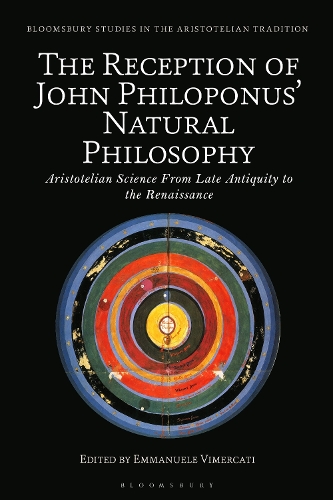
The Reception of John Philoponus Natural Philosophy: Aristotelian Science From Late Antiquity to the Renaissance
(Hardback)
Publishing Details
The Reception of John Philoponus Natural Philosophy: Aristotelian Science From Late Antiquity to the Renaissance
By (Author) Professor Emmanuele Vimercati
Bloomsbury Publishing PLC
Bloomsbury Academic
12th December 2024
United Kingdom
Classifications
Professional and Scholarly
Non Fiction
Ancient Greek and Roman philosophy
Philosophy of science
185
Physical Properties
Hardback
264
Width 154mm, Height 238mm, Spine 20mm
540g
Description
In some of his most famous works, John Philoponus (490-570 AD) confronts numerous aspects of Aristotles philosophy of science. Yet the influence of these reinterpretations and critiques remains under-examined. This volume fills this gap by uncovering the considerable impact of Philoponus natural philosophy in both the medieval and Renaissance periods. Divided into three parts, the first part of the volume introduces central concepts in Philoponus philosophy. Highlighting the areas of crossover and, more often, disagreement with Aristotle, chapters dedicate specific attention to Philoponus theories of place, matter and vacuum; his ideas of motion; his discussion of the heavens and the fifth element; and his anthropology. This is followed, in parts two and three, by a focus on Philoponus reception in the Middle Ages and the Renaissance respectively. Shedding light on the scientific ideas circulating in these periods, international experts explore a range of topics from the renewal of Aristotelianism in the Arab world, through the medieval Latin and Byzantine traditions, to Philoponus appearance in the early works of Galileo. Engaging with a number of Philoponus key tracts, The Reception of John Philoponus Natural Philosophy is both a much-needed study of Philoponus influence and a revealing analysis of how Aristotelian philosophy of science was received, adapted, critiqued and mediated throughout the Middle Ages and the Renaissance.
Author Bio
Emmanuele Vimercati is Professor of History of Ancient Philosophy at the Pontifical Lateran University, Rome, Italy. His previous titles include Fate, Providence and Free Will: Philosophy and Religion in Dialogue in the Early Imperial Age (2020), co-edited with R. Brouwer, and Nicholas of Cusa and the Aristotelian Tradition. A Philosophical and Theological Survey (2020), co-edited with V. Zaffino.
